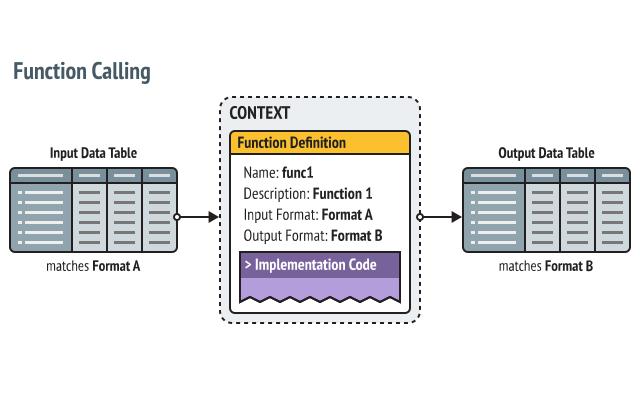Functions
Functions are context entities that can be executed to make the context or a device/system it represents do something.
Every function call accepts some input and returns some output. Both input and output are always Data Tables:
To call a function, you need to build an input Data Table with format that matches the function’s input format.
After a call, you get an output Data Table whose format matches the function’s output format.
Each of these Data Tables may have many records and fields, or even contain nested Data Tables in their cells, so the complexity of function input and output is virtually unlimited.
Sometimes functions are also referred to as operations or methods. Thus, calling a context function, executing a context operation, and invoking a context method have the same meaning. At the same time, context actions should not be confused with functions as they assume a sequence of server operations and interactions with users.
Function Definition
Every function is defined using a Function Definition. The Definition contains several options:
Function Name. The name is unique within the context in which the function is defined. This is a string that may contain only English characters, numbers, and underscore characters ("_").
Input Format. Table Format of the Data Table used to specify the input value of the function. Some functions have dynamic input format which means any table will be accepted as input.
Output Format. Format of a Data Table you should expect as a function call result. Some functions have dynamic format which basically means the definition doesn’t restrict the format of returned table.
Description. Human-friendly description of the function.
Help. Optional detailed description of the function.
Permissions. Permission level required to call the function.
Group. Shows that function belongs to a function group. Groups help join several similar functions together during different operations.
Examples
The Users context has a function called list ("List Users") that returns a list of all User Accounts on the server that are accessible to the user calling it.
The Scheduled Jobs context has a function called create ("Schedule New Job") that creates a new job with the specified parameters.
A users.admin.devices.dev1 context may contain a reboot ("Reboot") function that reboots the dev1 Device.
 | Note that functions are non-interactive in themselves. These are internal server operations - they happen "behind the scenes". To provide input for a function (or to view its output), interactive Actions with their UI Procedures are used. |
Function Implementation
Different functions have different implementations:
Some functions behave according to logic implemented in platform core or a plugin
Some functions delegate their logic to an external device
Some functions delegate their logic to a low code algorithm, such as a rule set

If a function is unable to finish its job, it will throw an exception containing a textual description of the problem.
Was this page helpful?